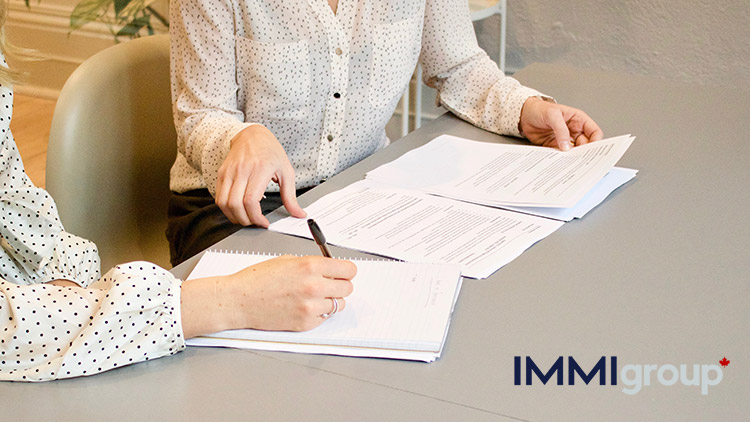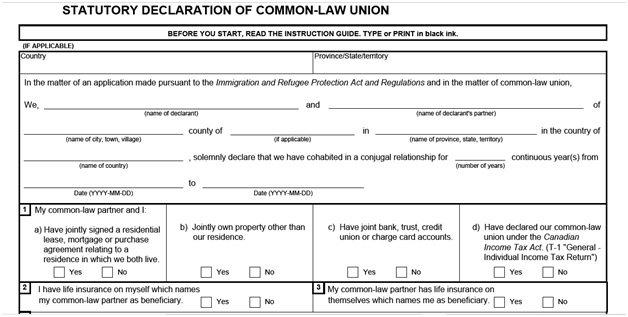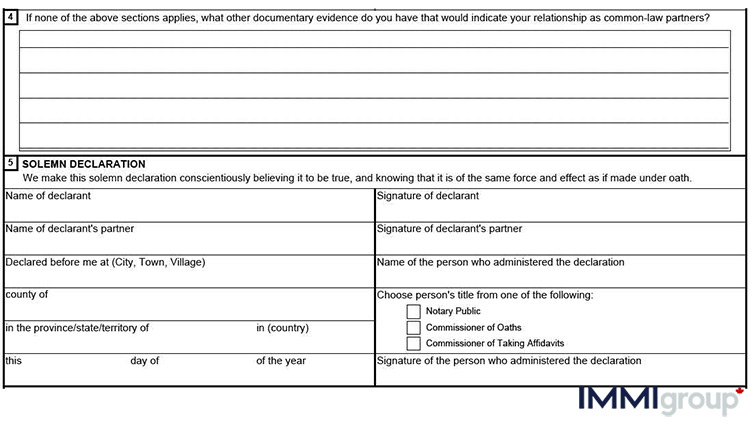IMM 5409 Statutory Declaration of Common-Law Union

If you are legally married or are sponsoring a Conjugal Partner then do not complete this form. As our couple in our application example are legally married, we do not have to fill out form IMM 5409.
This form is filled out by both the Sponsor and the Principal Applicant and is used to establish the validity of a Common-Law Union where you are not legally married but have been continuously co-habiting for at least 1 year. Because it is a legal declaration it must be sworn in the presence of a notary or similar official like a Commissioner of Oaths or Commissioner of Taking Affidavits.
Note: It is not necessary to complete this form if you have other proof of legal common-law status in Canada. However, since it is IRCC’s form, it is best to submit this form when submitting proof of a legal common-law status in Canada.
Question 1: Nature of Your Common Law Status
The first question asks if you whether you have
- Co-signed a lease or mortgage
- Jointly (the two of you) own any other property aside from your residence
- Joint bank accounts or credit cards
- Declared your common-law union when filing income taxes in Canada.
These things help establish that your relationship is genuine.
Questions 2 and 3: Life Insurance
These questions ask you whether or not you have named each other as beneficiaries of life insurance policies. This establishes a relationship between the two of you.
Question 4: Any other evidence you can give of co-habiting
For this question, you can provide any other proof you have of your common-law relationship.
As we mentioned in chapter 4, in a common-law relationship where you have co-habited together continuously for at least 1 year, you will not have a marriage certificate or a registration of marriage to prove your relationship to your case officer at IRCC.
So, what can you provide as proof of a common-law relationship?
-
- As we mentioned above, a copy of a lease in both your names for a period of at least 1 year.
- Any document showing joint-ownership of other properties.
- Utility, phone, cable bills, etcetera in both your names.
- Photos that prove your relationship – Please DO NOT send explicit photographs. Merely send photos of yourselves in social or home situations typical of a couple.
- Proof of financial support from the sponsor to the sponsored common-law partner – transfer records from a bank or other financial companies that specialize in overseas transfers.
- Shared employment benefits.
- Shared insurance policies.
-
- Shared vehicle insurance policies.
- Government-issued ID with the same address on each of the ID (like driver’s licenses).
- Any documents that show the same address whether they are held jointly or not – cellphone bills, credit card statements, pay stubs, tax forms, etc.
Remember, if you are not currently co-habiting, you must provide proof of your past co-habitation. This includes the above list of supporting documents but also – in the case where you are not currently co-habiting – can include the following:
- Up to 10 pages of what is called proof-of-contact which includes: text messages, letters, emails, social media conversations, and any other proof of contact between the sponsor and the principal applicant.
- Proof of sponsor visits during the period where you and your common-law partner were not co-habiting. This can include: ticket coupons, used boarding passes, photocopies of the relevant entry and exit visas in your passport etc.
- If you did not visit your common-law partner during this period, you need to provide a detailed written explanation why in Part C of Question 4 in form IMM 5409.
- Finally, remember that you need to be co-habiting with your common-law partner when IRCC decides whether or not to grant the Principal Applicant permanent residence status. If possible, avoid anything more than a brief separation when in a common-law relationship. And at the very least try as much as reasonably possible to co-habit during the application process.
Finally, if you refer back to Chapter 4 where we analyze form IMM 5532, in Part C of that form you will find question 11 where you can add any information that you feel would prove the validity of your relationship.
In other words, the supporting documents we’ve just listed for you are only part of the evidence you need as proof. Across various forms and by means of a number of types of supporting documents, you will have the chance to prove your relationship to IRCC officials. Make sure you take advantage of any and all that are necessary given your particular situation.
Click here to download your IMM 5409
If you cannot see the above PDF, please right click on this link to the pdf form and “save link as” to your desktop so you can view it on your computer.
We hope you found this content to be helpful.
At Immigroup we provide do-it-yourselfers with clear and accurate information. (For best results, we recommend using the government’s website in conjunction with our ours. For answers to specific questions, please check out our forum. Do these simple things and you’ll be far ahead of the pack!)
For those who want more expertise and support, we offer a broad range of paid services. Let us be your immigration ally, and you’ll see why most of our clients are clients for life.
If you’ve found this course helpful, please leave a review in the comment section below
Paid Sponsorship Service from Immigroup
IMM 5409 – Statutory Declaration of Common-Law Union for Parental Sponsorship
This is filled out by both the Sponsor and the co-signer (who has to a spouse or common-law partner) ONLY when the co-signer and sponsor are in a common-law relationship. The form is used to establish the validity of a Common-Law Union where you are not legally married but have been continuously co-habiting for at least 1 year. If you are legally married or do not have a co-signer, then you do not have to fill out this form.
Because it is a legal declaration it must be sworn in the presence of a notary or similar official like a Commissioner of Oaths or Commissioner of Taking Affidavits. It essentially asks you whether you have:
- Question 1
- Co-signed a lease or mortgage
- Jointly (the two of you) own any other property aside from your residence
- Have joint bank accounts or credit cards
- Have declared your common-law union when filing income taxes in Canada.
- Questions 2 and 3: named each other as beneficiaries of life insurance policies
- Question 4: Any other evidence you can give of co-habiting

